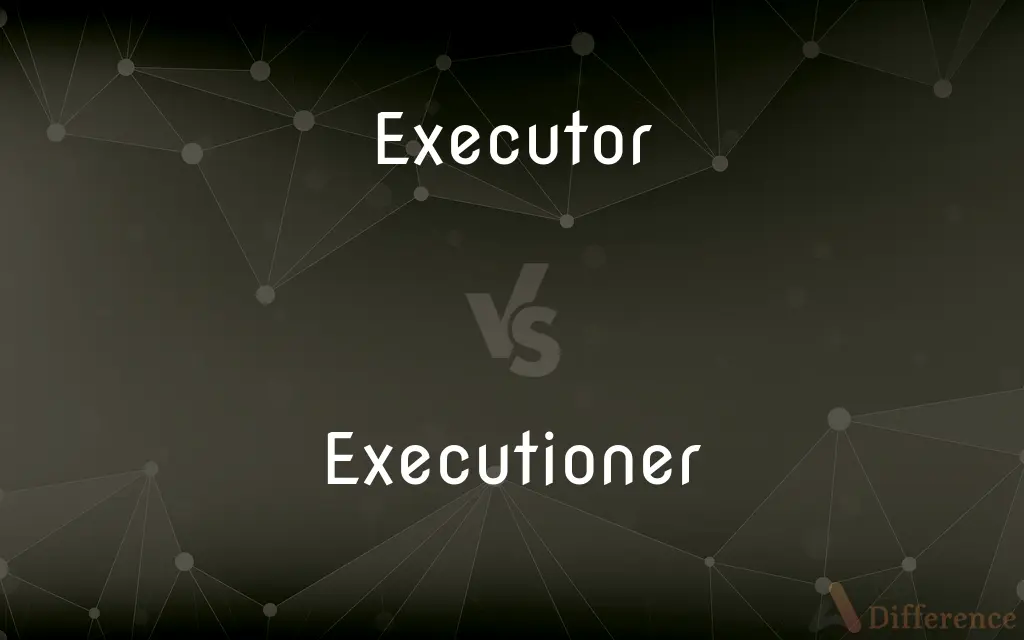Executor vs. Executioner — What's the Difference?
By Maham Liaqat & Fiza Rafique — Updated on March 19, 2024
An executor is responsible for carrying out the terms of a will, dealing with legal and financial affairs; an executioner carries out death sentences, a role defined by law or justice.

Difference Between Executor and Executioner
Table of Contents
ADVERTISEMENT
Key Differences
An executor is a person appointed to administer the estate of a deceased person, ensuring that the deceased's wishes as expressed in their will are fulfilled. This role involves managing assets, paying debts, and distributing what remains to the rightful beneficiaries. On the other hand, an executioner is tasked with carrying out capital punishment sentences, a role steeped in legal and sometimes historical contexts.
Executors play a critical legal and financial role in the aftermath of someone’s death, often involving detailed paperwork, court interactions, and financial management. Their work is guided by the principles of fidelity to the deceased's wishes and the law. Executioners, however, operate within a much different realm, where their duties are focused on the physical act of executing a court's death sentence, a role that has ethical, moral, and social implications.
The role of an executor is typically filled by a close family member, friend, or a professional like a lawyer, who is chosen for their trustworthiness and organizational skills. Executioners are usually appointed by the government or judicial system, and their identity can sometimes be anonymous, reflecting the controversial nature of their duties.
While executors are crucial in the private sphere, affecting the deceased's family and beneficiaries directly through the administration of the estate, executioners function in the public domain, where their actions reflect broader societal and legal judgments about crime and punishment.
Comparison Chart
Definition
Manages a deceased's estate as per their will
Carries out death sentences
ADVERTISEMENT
Role Context
Legal and financial
Legal and punitive
Primary Duties
Asset management, debt payment, distribution to beneficiaries
Performing capital punishment
Appointed by
Named in a will or by a court
Government or judicial authority
Impact
Affects the deceased’s family and beneficiaries
Reflects societal laws and views on punishment
Compare with Definitions
Executor
Ensures beneficiaries receive their inheritance.
He diligently executed his role as executor, distributing assets to the family.
Executioner
May perform duties anonymously.
The executioner wore a hood to maintain anonymity during the execution.
Executor
Oversees estate settlement.
As executor, she had to appraise the estate's assets before distribution.
Executioner
Official tasked with carrying out death sentences.
The executioner performed the sentence as mandated by the court.
Executor
Person responsible for executing a will.
The executor sorted through the deceased's paperwork to fulfill their last wishes.
Executioner
Faces ethical and moral considerations.
An executioner must navigate the complex moral implications of their duties.
Executor
Manages financial affairs posthumously.
The executor paid off the remaining debts from the estate funds.
Executioner
Works within legal frameworks.
The executioner's role is strictly defined by law and judicial decisions.
Executor
Acts in the best interest of the deceased’s estate.
The executor contested a dubious claim against the estate to protect the assets.
Executioner
Associated with historical and modern legal systems.
Throughout history, the role of the executioner has evolved with societal views on justice.
Executor
An executor is someone who is responsible for executing, or following through on, an assigned task or duty. The feminine form, executrix, may sometimes be used.
Executioner
An executioner, also known as a hangman or headsman, is an official who carries out a sentence of capital punishment on a legally condemned person.
Executor
A person or institution appointed by a testator to carry out the terms of their will
The executors of the late John B. Smith
Hugh appointed him an executor of his will
Executioner
One who executes a condemned person.
Executor
A person who produces something or puts something into effect
The makers and executors of policy
Executioner
An official person who carries out the capital punishment of a criminal.
Executor
(Law) A person who is appointed by a testator to execute the testator's will.
Executioner
(archaic) Executor.
Executor
A person who carries out or performs something.
Executioner
A hit man, especially being in some organization.
Executor
A person who carries out some task.
Executioner
One who executes; an executer.
Executor
(computing) A component of a system that executes or runs something.
Executioner
One who puts to death in conformity to legal warrant, as a hangman.
Executor
(legal) Someone appointed by a testator to administer a will; an administrator.
Literary executor
Executioner
An official who inflicts capital punishment in pursuit of a warrant
Executor
(obsolete) An executioner.
Executor
One who executes or performs; a doer; as, an executor of baseness.
Executor
An executioner.
Delivering o'er to executors paw The lazy, yawning drone.
Executor
The person appointed by a testator to execute his will, or to see its provisions carried into effect, after his decease.
Executor
A person appointed by a testator to carry out the terms of the will
Common Curiosities
How are executioners chosen?
Executioners are usually selected through a governmental or judicial appointment process, sometimes based on specific qualifications or training.
Can anyone be appointed as an executor of a will?
Yes, anyone can be appointed as an executor, but they must be willing and able to carry out the required duties.
What legal responsibilities does an executor have?
An executor is legally responsible for administering the deceased's estate according to the will and state laws.
Do executors get paid for their work?
Executors may receive compensation for their time and expenses, as dictated by the will or state law.
Is being an executioner a government job?
Yes, executioners are typically employed or sanctioned by the government or the judicial system.
What psychological impact does the role of an executioner have?
The role of an executioner can have significant psychological impacts, including stress and moral questioning, despite professional detachment.
Can an executor refuse their appointment?
Yes, an appointed executor can decline the role, in which case an alternate executor may be named or appointed by the court.
Can an executor benefit from a will?
Yes, an executor can also be a beneficiary of the will they are executing.
Are there ethical debates about the role of executioners?
Yes, the role of executioners is at the center of ethical and moral debates concerning capital punishment and its implementation.
Have methods of execution changed over time?
Yes, methods of execution have evolved, reflecting changes in technology, societal views, and legal standards.
What kind of training do executioners receive?
Executioners may receive specific training related to the methods of execution and psychological support to handle the role's demands.
What supports are available for executioners facing psychological stress?
Support mechanisms can include counseling, professional psychological support, and peer groups, depending on the jurisdiction and organization.
How do cultural and historical contexts influence the roles of executors and executioners?
Cultural and historical contexts significantly influence the perception, duties, and societal roles of executors and executioners, reflecting varying attitudes towards death, inheritance, and capital punishment.
How does society view executors and executioners?
Society's views vary widely, with executors often seen as fulfilling a necessary legal role, while executioners can be viewed through the lens of broader debates on justice and morality.
What happens if an executor fails to perform their duties?
An executor who fails to perform their duties can be removed by the court, and a replacement executor can be appointed.
Share Your Discovery

Previous Comparison
Approve vs. Accept
Next Comparison
Bliss vs. HappinessAuthor Spotlight
Written by
Maham LiaqatCo-written by
Fiza RafiqueFiza Rafique is a skilled content writer at AskDifference.com, where she meticulously refines and enhances written pieces. Drawing from her vast editorial expertise, Fiza ensures clarity, accuracy, and precision in every article. Passionate about language, she continually seeks to elevate the quality of content for readers worldwide.
















































